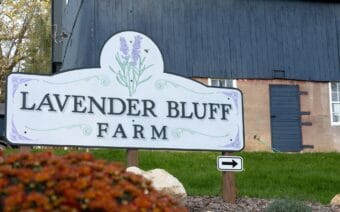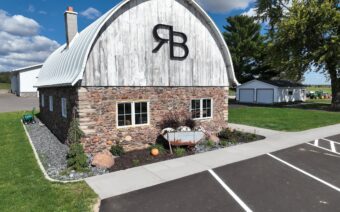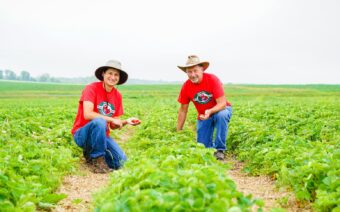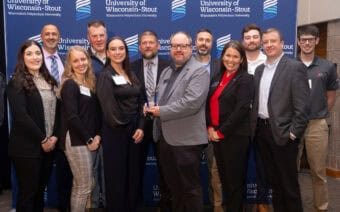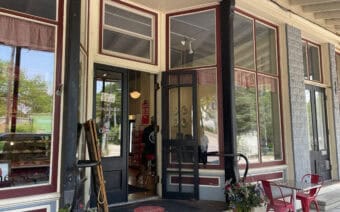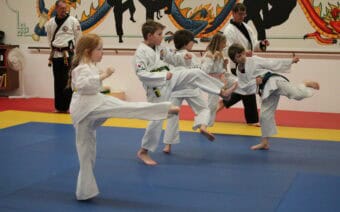February 19, 2024
RIVER FALLS – The dairy plant at the University of Wisconsin-River Falls is slowly returning to full operation.
Five years after the university closed the plant due to its outdated equipment, the new Wuethrich Family/Grassland Dairy Center of Excellence at the University of Wisconsin-River Falls (UWRF) opened last fall.
Now after some final tweaks, Rueben Nilsson – who became the plant’s manager earlier this year – said it will soon produce cheese and hopes to make ice cream by the end of March.
A long-time coming
Nilsson said plans for the remodeled plant began more than 10 years ago.
Unfortunately, the COVID-19 pandemic, supply issues, unexpected costs and other issues slowed the project.
Recognizing the plant’s importance, Nilsson said many agriculture businesses were key backers of the project with nearly two dozen organizations donating $5.2 million toward the dairy plant.
He said the state picked up the remainder of the nearly $9-million price tag.
Nilsson said the high degree of private funding received for a Universities of Wisconsin project is usual – showing the dairy industry was invested in making the plant a success.
A good fit
Before arriving at UWRF, Nilsson spent nearly two decades in the dairy industry.
He said his varied experiences will help him as he teaches students about how the plant works.
“I enjoy the ins and outs of creating, of working on details and being able to find ways to make better-tasting products,” he said. “One of my experiences was in a start-up, so I know how to make cheese on a smaller level.”
Nilsson said as his career in dairy progressed, he wore many different hats.
“Now I’m excited to see what I can do with the dairy plant here at UWRF,” he said. “I get to help the dairy industry and students learn. I get to make this a place where we can experiment a bit and create and fine-tune products. For me, this is a dream job.”
Michael Orth, dean of the UWRF College of Agriculture, Food and Environmental Sciences, said Nilsson is the ideal person to transition from the dairy pilot plant that former manager Michelle Farner helped create to an operating plant that will serve as a test site that educates students and industry workers while producing high-quality cheese and ice cream.
“I look forward to seeing how he will bring to fruition the vision that our college and industry had 10 years ago when the commitment to renovate and upgrade the dairy plant was made,” he said.
Project specifics
Nilsson said the renovated UWRF dairy plant now provides hands-on learning opportunities to students and dairy industry employees – setting the training stage for future generations.
The renovation project included a variety of upgrades and changes, including:
- An enlarged cheese manufacturing area and a dedicated space for raw milk processing and separation.
- Increased HTST (high-temperature short time) capacity, including additional cheese vats and processed cheese cookers for improved pilot plant capabilities.
- Modernized dairy plant equipment and processes to help provide more effective teaching and outreach programming
- The introduction of additional product and processing safety and security features by integrating the separation of raw product handling and whey processing
The 6,000-square-foot dairy pilot plant was renamed for the Wuethrich Family Foundation and Grassland Dairy Products, Inc. through a $1 million naming rights donation.
Nilsson said the plant – which is one of 15 in the nation and second in Wisconsin (other at UW-Madison) – will create unique opportunities for faculty, staff and students to interact with industry leaders.
“This is something unique and will enhance education because students get hands-on experience with the equipment,” Nilsson said. “It will be exciting to have the students back working in the plant and using it for classes and training.”
Plant specifics
The plant has milk tanks, separators, pasteurizers, a cream separator, an ingredient mixer and other cheesemaking equipment.
Nilsson said it is called a pilot plant because not all of the equipment is the same size as what someone would find in a regular cheesemaking operation.
“It is all the same – just a little smaller – and students will see this same equipment as they go out and look for jobs in the field,” he said.
Nilsson said the plant will be put to good use with trainings and dairy short courses.
“There is a high demand for workers in the cheesemaking and dairy industries, and they can receive the training they need right here,” he said.
For example, the university will offer training to dairy industry employees who need to be certified before using a pasteurizer.
The plant employs students to make cheese and ice cream – using milk from the cows at the university’s Mann Valley Farm.
Students will also use the dairy plant as instructors incorporate it into their coursework.
Nilsson said the plant will also serve as a “test site” of sorts – a place to experiment a bit with different varieties of cheese and ice cream.
 Bellin’s Casey honored with WACEP Distinguished Service Award
Bellin’s Casey honored with WACEP Distinguished Service Award Pips ’n Chicks inspires a digital age of farming
Pips ’n Chicks inspires a digital age of farming


